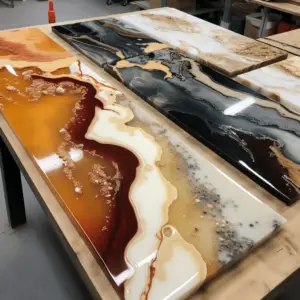Epoxy vs Polyester Resin, The terms epoxy and epoxy resin are commonly used interchangeably and in the complex world of material science, it is easy to understand why the distinction is so elusive.
Epoxy, however, is a class of end products made by cross-linking epoxy resin with other materials including a hardener to form the solid surface or block which is a thermoset. Therefore, is a raw material and a composite of epoxy.
Based on the specific hardness and the project you are working on, you will end up with different kinds of epoxy thermosets.
Polyester resin is a synthetic substance made by chemically combining organic and inorganic materials with the end product being a resin that can be hardened to varying degrees by the addition of a hardening agent just like epoxy.
The most common hardening agent that is used with polyester resin is styrene.
The two materials are similar in the above ways but are separated by several important features that are critical to their application.
When selecting either resin to make a final product, the kind of project you intend to work on should guide you but some of the differences between these two resins will also matter significantly.
Table of Contents
Epoxy vs Polyester Resin: Differences

Comparing these two resins generally means comparing the end products as well. The following is a comparison of the characteristics of these two materials.
- Bonding strength
- Moisture resistance
- Curing time
- Heat resistance
- Smell and toxicity
- Ease of use
- Cost
Epoxy vs Polyester Resin: Bonding strength
Molecules are bigger and more complicated than polyester molecules, so they make more bonds and are stronger.
Epoxy has a stronger bond than polyester resin and, based on what it is made of, can be a very hard block.
It can handle four times as much pressure per square inch as rayon.
Epoxy sticks to other things better than glue, while polyester sheets usually need glue to stick.
Epoxy vs Polyester Resin: Moisture resistance
It can be used underwater and in moist places since it is moisture-resistant when properly prepared.
It is used to protect boat wood from rot and lasts for years.
Minimal moisture resistance in polyester. Despite being insoluble, moisture can damage it, limiting its use, especially in industrial settings.
Polyester is versatile in home and some commercial settings, including as fast food restaurants, where it is used for windows and other surfaces.
Epoxy vs Polyester Resin: Curing time
Polyester resin takes a shorter time to cure compared to epoxy. The curing time is however dependent on your formulation.
This may be an advantage or a disadvantage but generally, a fast curing resin may present difficulty in working with since it denies you the opportunity to both work, mold, and fine-tune the resin to what you intend.
Epoxy will take longer to cure which means you may have enough time to mold the resin before it sets which is an irreversible process.
Epoxy vs Polyester Resin: Heat resistance
It would take a lot of heat to break epoxy thermosets, which is why they are often used in industries where heat is used all the time, like making food and drinks.
Layers of epoxy are put on the floors to keep them from getting damaged and to stop fires, which are always a risk in production.
Polyester, which is made of polyester resin, doesn’t stand up well to heat. Even the toughest polyester can be killed by direct heat.
Even though polyester is often used in the kitchens of restaurants and cafes, it is never heated directly or for a long time.
When exposed to strong sunlight for a long time, the bonds between the molecules that make up polyester can weaken or break. This can make polyester warp and bend.
Epoxy vs Polyester Resin: Smell and toxicity
Polyester resin has a characteristically pungent smell and continuous exposure to these fumes has been found to be a cause of respiratory health challenges, especially when working with uncured polyester.
Epoxy is more stable but it has been known to trigger dermatitis when exposed to bare skin, particularly while it is still in its uncured form.
Polyester is highly toxic to the environment and despite its versatile usage across many areas of domestic life and commerce, many governments are finding it unsustainable to continue to dump used polyester into the environment since its slow degradation and high toxicity are choking the planet fast.
Epoxy is a fairer choice when you consider that it lasts decades and is comprised largely of organic materials that pose a risk to the environment but not as dangerous as the one posed by polyester.
Epoxy vs Polyester Resin: Ease of use

Polyester resin is a much harder material to manipulate and work with compared to epoxy resin. The fact that it cures quickly is part of the problem. Preparing polyester resin and getting the resultant mixtures just right in a DIY project can prove difficult.
Epoxy can be fairly straightforward to work with since the proportions to formulate the thermoset are quite specific and the curing process needs no interference.
Epoxy vs Polyester Resin: Cost
Polyester resin and polyester itself are considered the workhorse of thermoplastics and thermosets and their applications are numerous across all industries and sectors.
Its availability is constant and its versatility continues to evolve new applications every now and then which is why it is rather difficult to ban.
Epoxy is more expensive comparatively due to its properties especially its resistance to wear, moisture damage, heat damage, and its superior bonding strength.
It is the better option for heavier duty applications and numerous industrial and manufacturing sectors have switched to epoxy floors almost exclusively.


